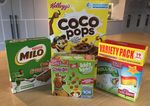Sugary Drinks - Time to make real change
by Emma Groves, Obesity Policy Senior Coordinator
- April 9, 2018
- Leave a comment
- WA
- Marketing
- Healthy eating
- Top Tips
- Sugary drinks
- Industry
- Junk Food
- Sugar
- Wellness
- Public Health
- Advocacy
The beverage industry spends millions of dollars a year in Western Australia alone to advertise and promote sugary drinks. Combine this with their widespread availability, the beverage industry has convinced us that sugary drinks are an acceptable choice of drink.
Given that a single serve of sugary drink contains over the maximum daily limit for added sugar, and the evidence linking sugary drinks to overweight and obesity, tooth decay and chronic disease is well established, it’s time to reconsider where they are sold.
When sugary drinks are sold in settings such as s port and recreation clubs, hospital and health facilities , workplaces and community locations such as public transport stations and libraries it sends the wrong message. We can’t underestimate the role these settings have in role-modelling healthy behaviours, particularly to children.
The good news is that we know it can be done.
Case-studies have shown that organisations are able to reduce or restrict completely the sale of sugary drinks without losing business. Recently, YMCA in Victoria has banned the sale of sugary drinks from every one of their 150 centres, as has the City of Geelong and the entire New South Wales health service.
These organisations have recognised the detrimental effect sugary drinks are having on the community and showing great leadership by removing them from sale.
We need your help
Start the conversation in your workplace or local sporting group to address the sale and availability of sugary drinks.
- Contact LiveLighter to see how we can assist you to make real change.
- Check out The Facts About Sugary Drinks for links to organisations that have resources to assist.
- Raise awareness of the amount of sugary in sugary drinks by sharing our LiveLighter Sugary Drinks Calculator or Youtube videos.




